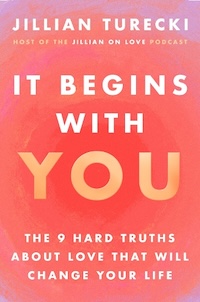
“It Begins With You” is a relationship book by Jillian Turecki. It has nine sections, each exploring a key truth about love and relationships.

“It Begins With You” is a relationship book by Jillian Turecki. It has nine sections, each exploring a key truth about love and relationships.
Passing through Vondelpark in Amsterdam, you’ll see a man playing football next to a sign that says “Save the Kids from the Phone”. Meet Albert, he’s on a mission.
Growing up with an absent father, Albert found himself addicted to alcohol. He says he wasted 30 years of his life watching television. His pain is now his purpose. He doesn’t want kids to go through the same experience.
Albert always wanted to be a football player. That’s why he’s at the park every day playing football.
Sugar addiction had been part of my life for years without me realizing it. I turned to it when I was stressed, when I needed to focus, or when I had digestive discomfort. The result? I found myself with 22% body fat despite exercising regularly 3-5 days a week.
After seeing my measurements, the trainer asked: “Which one is it - alcohol or sugar?” I rarely drink alcohol so the culprit was obvious.

Padel is a racket sport growing in popularity. I’m seeing new courts open up and my friends picking it up. Search volume for “padel” is up 900% YoY in many countries. This growth is driven partially by economics of this sport.
Padel is tennis made more profitable. You can fit two padel courts in the same space that one tennis court takes up. Tennis is usually played by two people, whereas padel is typically played by four people, so court owners can make more money per square meter. This economic incentive is generating a supply driven growth. According to law of markets, every supply creates its own demand. This suggests that we’ll see an increase in players of this sport.
Industrial Society and Its Future, aka The Unabomber Manifesto, was published 30 years ago in 1995 and touches on many topics that are surprisingly relevant today. For instance, longevity is a popular topic today, here’s what the manifesto had to say about it:
We suggest that modern man’s obsession with longevity, and with maintaining physical vigor and sexual attractiveness to an advanced age, is a symptom of unfulfillment resulting from deprivation with respect to the power process. The “mid-life crisis” also is such a symptom. So is the lack of interest in having children that is fairly common in modern society but almost unheard-of in primitive societies. A young man goes through the power process by becoming a hunter, hunting not for sport or for fulfilment but to get meat that is necessary for food…Having successfully raised his children, going through the power process by providing them with the physical necessities, the primitive man feels that his work is done and he is prepared to accept old age and death.
Recently, a few movies and TV shows have explored the idea of one person possessing two distinct consciousnesses.
In the TV series Severance, each employee has two personalities: their “Innie” while at work, and “Outie” for their outside lives. Their minds are completely compartmentalized, so neither self has any memory of what the other experiences.
Similarly, in the movie “The Substance”, Elisabeth injects a serum and swaps consciousness with Sue, a younger version of herself, for seven days.
When choosing a career, we often focus on the outcome. Take being a doctor, for example. The outcome of being a doctor is incredibly rewarding: curing patients and helping others, good income, high social status.
However the process of being a doctor involves years of education and internships, night shifts and hospital environment, and constant exposure to sickness. For many, the process is far from enjoyable, and they end up regretting their decision because they focused solely on the outcome.
What if your job hasn’t been invented yet?
I spent ten years of my career building mobile apps — a job that didn’t even exist before 2007, when the iPhone was introduced. Fun fact: when the iPhone first launched, you couldn’t even install apps. Now it’s hard to imagine life without them.
Take “influencers” or social media managers, for instance. These jobs didn’t exist 20 years ago, they became possible with the rise of platforms like Facebook and Instagram.
Driving through rows of auto repair shops this summer, we arrived at a quirky ice cream shop in Ayvalık. Tasked with picking flavors for the family, I defaulted to my usuals—chocolate, vanilla, coconut, blackberry. But the owner interrupted, suggesting tahini as one of his favorites.
Tahini? Not a flavor I would have picked myself but out of politeness and a bit of spontaneity, I said yes.
Back home, as we sampled the flavors, tahini turned out to be the clear winner: perfecly balanced, nutty and creamy. If I had stuck to my classics, I would have missed the best flavor.
Gratitude doesn’t come naturally to me.
When it comes to practicing gratitude, one approach is thinking of people less fortunate. I try to avoid comparing myself to others — it doesn’t resonate with me because I struggle to empathize in that way. Instead, I’ve found it much easier to use myself as the reference point.
I also find it difficult to identify positive aspects of my life. For me, it is easier to think of the negative: what could be worse!